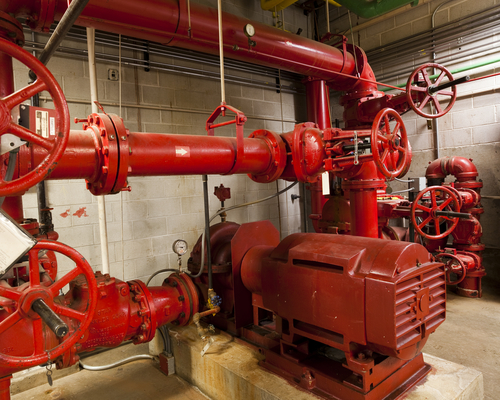
When it comes to fire protection systems, one of the key components that play a crucial role in ensuring the safety of a building is the fire pump. Fire pumps are an essential part of any fire protection system, as they provide the necessary pressure to ensure that water is delivered to the sprinkler system in the event of a fire. In this blog post, we will explore the role and importance of fire pumps in fire protection systems, as well as how they work and why they are necessary.
What Is a Fire Pump and How Does It Work?
A fire pump is a mechanical device that is designed to increase the water pressure in a fire protection system. In a fire protection system, water is stored in a reservoir or tank, and when a fire is detected, the fire pump is activated to increase the water pressure and flow rate to the sprinkler system. This ensures that water is delivered to the sprinklers at the required pressure to effectively combat the fire.
Fire pumps are typically powered by electricity, diesel, or steam, depending on the specific requirements of the building and the fire protection system. They are designed to operate automatically when the fire alarm system is triggered, and they can also be manually activated in case of an emergency. Fire pumps are equipped with sensors and monitoring devices to ensure that they are functioning properly and are ready to respond to a fire at a moment’s notice.
Why Are Fire Pumps Necessary in a Fire Protection System?
Fire pumps are a critical component of any fire protection system for several reasons. One of the main reasons why fire pumps are necessary is to overcome the friction losses in the piping system and deliver water at the required pressure to the sprinklers. Without a fire pump, the water pressure in the system may not be sufficient to effectively control or extinguish a fire, which could result in greater damage to the building and increased risk to occupants.
Another reason why fire pumps are necessary is to ensure that water is delivered to all parts of the building, including areas that may be located at a higher elevation or have long horizontal runs of piping. Fire pumps are responsible for providing the necessary pressure to distribute water evenly throughout the building, so that all areas are adequately protected in the event of a fire.
Fire pumps are also necessary to comply with building codes and regulations that require buildings to have a certain level of fire protection. Fire pumps are often a mandatory requirement for high-rise buildings, industrial facilities, and other structures where the risk of fire is higher. By installing a fire pump in a building, property owners can ensure that their building meets the necessary safety standards and regulations to protect occupants and property in the event of a fire.
Summary
Fire pumps play a critical role in fire protection systems by providing the necessary pressure to deliver water to the sprinkler system in the event of a fire. They are essential for ensuring that water is distributed evenly throughout the building and that all areas are adequately protected. By understanding the role and importance of fire pumps, property owners can take the necessary steps to ensure that their building is equipped with the right fire protection system to effectively respond to a fire emergency.
Need a Fire Protection Company in Dalton, GA?
Carpet Capital Fire Protection, Inc. is your fire protection specialist in Dalton and the surrounding areas in Northern Georgia. With over 40 years of experience, we always go above and beyond our customers’ requests and expectations in order to ensure all of their fire protection needs. The founder of Carpet Capital Fire Protection Inc. wanted to create a fire protection company in the area that guaranteed a better quality of work, better prices, and a better overall customer relationship. We will help to ensure that your property meets local or state fire codes, insurance fire codes, and municipality-related fire codes. Contact us today to learn more about what we can do for you!
